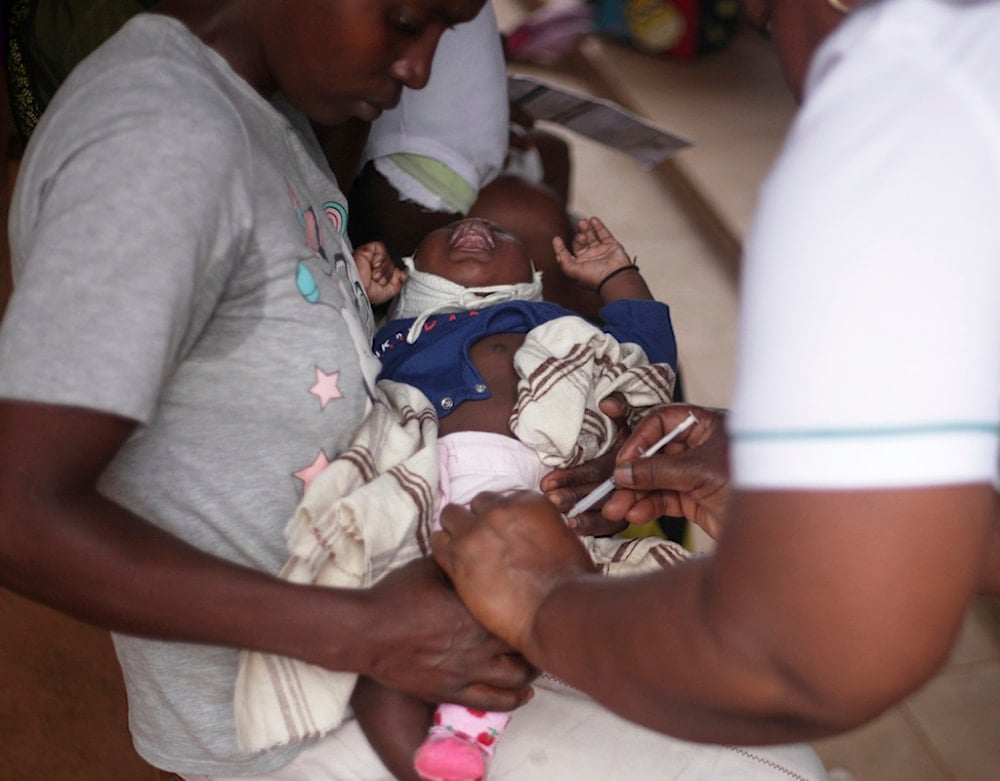Funding cuts threaten global fight against malaria, experts warn
Experts warn that reduced contributions from wealthy nations to the Global Fund could reverse decades of progress against malaria.
-

A child receives a vaccine shot at Wakiso Health Center IV in Wakiso, Uganda, on Wednesday, July 23, 2025. (AP)
A sharp reduction in donations from wealthy nations to the Global Fund to Fight AIDS, Tuberculosis, and Malaria could trigger a devastating resurgence of malaria, putting millions of lives at risk and costing the global economy billions by the end of the decade, according to a new study.
The report warns that progress against the disease is being undermined by multiple threats, including extreme weather events, humanitarian emergencies that expand exposure to mosquitoes, and increasing resistance to insecticides and treatment drugs.
Speaking to The Guardian, Gareth Jenkins from Malaria No More UK warned that the world could be on the brink of disaster, saying, "Cutting funding risks the deadliest resurgence we've ever seen."
The study, commissioned jointly by Malaria No More UK and the African Leaders Malaria Alliance (Alma), assessed the potential consequences of reduced support for the Global Fund, which supplies almost 60% of international financing for malaria control programs such as mosquito net distribution and preventive medication.
If contributions fall by 20% compared with the previous funding cycle, researchers project 33 million additional infections and 82,000 more deaths by 2030, along with an estimated $5.14 billion (£3.83 billion) in lost GDP. The fund is currently seeking to raise $18 billion to cover operations between 2027 and 2029.
Donor cuts loom
The warning comes as major donors signal possible cutbacks. Germany last week pledged $1 billion, about 23% less than its last commitment, while the UK government is reportedly considering a reduction of around 20%, though it insists a final decision has yet to be made.
The report also models a worst-case scenario in which malaria prevention efforts collapse altogether, leading to 525 million extra cases, nearly one million additional deaths, and $83 billion in economic losses. Around 750,000 of those deaths would be among children under five, a toll described by the authors as "the loss of a generation to malaria."
Conversely, meeting the Global Fund's full target would prevent 865 million cases and 1.86 million deaths, while generating an estimated $230 billion boost to GDP.
Global solidarity
Joy Phumaphi, Alma's executive secretary and a former health minister of Botswana, said African governments were investing more of their own resources into combating malaria, but external support remained critical. "African countries are stepping up to the plate, and we are appealing to the rest of the world to accompany us on this journey, because all of us need to be part of the end story of malaria," she told The Guardian.
Phumaphi noted that nations still grappling with the economic fallout of the pandemic and heavy debt burdens are now facing both infectious and chronic diseases, including diabetes and cancer. While acknowledging Germany's "substantial" contribution, she added, "I think we need to appreciate the enormity of the challenge and exactly how much is required in funding in order for countries to be able to catch up."
Funding appeal
The report calls on the private sector and philanthropists to fill funding gaps, arguing that malaria's economic drag is too significant to ignore. Nigerian billionaire Aliko Dangote, who has previously supported health initiatives, urged others to follow suit. "Malaria is not just a health crisis; it is an $83bn brake on Africa's growth and enterprise. Business cannot thrive in sick communities," he said.
Researchers assessed malaria's impact on national economies by measuring disruptions to education, labor productivity, tourism, and agriculture, concluding that failing to sustain funding would carry an immense human and financial cost.
Read more: By sheer chance, bacteria found to help in combatting malaria

 4 Min Read
4 Min Read










